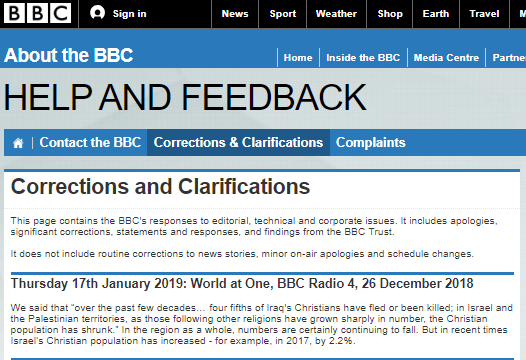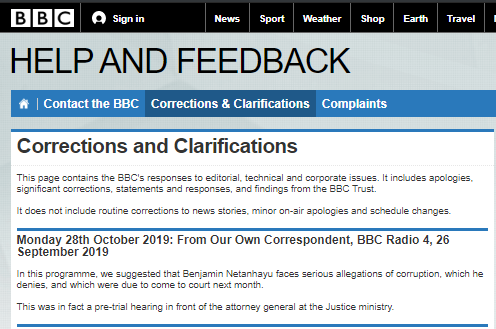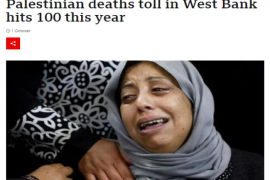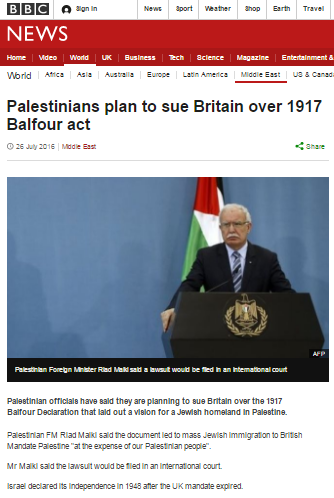Throughout 2019 BBC Watch prompted the following corrections to BBC content on various platforms:
January:
BBC Radio 4 corrected an inaccurate claim concerning Israel’s Christian population.
After second complaint, BBC clarifies inaccurate claim about Israel’s Christian population
BBC adds missing link following further complaint
February:
The BBC Sport website amended a misrepresentation of a statement from Israel’s foreign ministry.
BBC Watch prompts correction to BBC Sport report
The BBC News website amended claims concerning Lebanese casualties during the Second Lebanon War in three reports.
BBC News website amends Second Lebanon War claim
March:
The BBC News website corrected a report concerning the mixed prayer area at the Western Wall.
BBC News website corrects Western Wall report following complaints
April:
BBC Radio 4 apologised for breaching the corporation’s own style guide on the use of the term Palestine.
BBC apologises for ‘unfortunate oversight’
The BBC News website amended a misleading headline in a profile of Benny Gantz.
BBC News amends errors in election candidate profile
The BBC News website corrected three articles in which it was claimed that the Gaza Strip is under the control of the Palestinian Authority.
BBC News corrects inaccurate ‘Palestinian unity government’ claims
May:
The BBC News website removed a video in which a false Hamas claim concerning the death of a baby and a pregnant woman in the Gaza Strip was amplified.
Islamic Jihad unravels BBC amplification of Hamas claim
The BBC News website corrected a mistranslation in an article about vultures in the Golan Heights.
The BBC News website corrected an inaccurate portrayal of the Jewish day of rest.
BBC Watch prompts two BBC News website corrections
The BBC Arabic website removed a Nazi analogy.
BBC Watch prompts removal of Nazi analogy from BBC Arabic website
June:
The BBC News website removed an inaccurate claim concerning water from a profile of the Golan Heights.
BBC News website removes inaccurate claim from online profile
The BBC News website belatedly amended a claim concerning women’s rights in Iran.
Over four months on BBC News amends claims about women’s rights in Iran
The BBC News website corrected a false claim concerning Israel’s extradition policy.
BBC Watch prompts correction to inaccurate extradition claim
July:
The BBC News website corrected an inaccurate quote from the US Ambassador to Israel.
BBC Watch prompts correction of inaccurate US ambassador quote
September:
BBC World Service radio re-edited a programme in which it was claimed that there is a ‘siege’ on the Gaza Strip.
BBC WS radio corrects inaccurate claim of a ‘siege’ on the Gaza Strip
The BBC News website corrected a report in which Binyamin Netanyahu was described as Israel’s president.
BBC News website gives Israel’s prime minister an upgrade
October:
BBC Radio 4 corrected an inaccurate claim made by the BBC’s Middle East editor.
BBC clarifies inaccurate claim by Jeremy Bowen but fails to meet editorial guidelines
November:
The BBC News website corrected an inaccurate portrayal of an Israeli politician.
BBC News website corrects inaccurate description of Israeli MK
December:
The BBC News website corrected a misrepresentation of the IHRA working definition of antisemitism.
BBC Watch prompts correction to report on French antisemitism resolution
The BBC’s ‘Newsround’ amended a photo feature which breached the corporation’s style guide on the use of the term Palestine.
BBC amends ‘Newsround’ Christmas feature which breached style guide
Once again this year we saw inconsistent use of footnotes to inform audiences of amendments to BBC News website reports and the continued absence of a corrections page on that platform means that those who read reports when they are first published – and are unlikely to revisit them at a later date – all too often remain unaware that information they were given was inaccurate.
Likewise, we saw at least one case this year in which the BBC failed to comply with its own editorial guidelines on “Correcting Mistakes”.
A significant proportion of the complaints submitted by BBC Watch in 2019 did not receive a response in the time frame set by the BBC itself and in some cases a response was not received at all. In August we received a communication from the BBC World Service which included:
“…apologies for evidently yet-to-come replies due to the volume of correspondence and (un)availability of relevant staff. I hope you will understand…”
As we have previously stated:
“Regrettably, in the two and a half years since OFCOM became the BBC’s external regulator BBC Watch has been unable to discern any meaningful improvement in the BBC’s handling of complaints which, in contrast to OFCOM’s opinion, we consider to be far too slow in comparison to other media outlets, cumbersome and lacking transparency.”
Related Articles:




